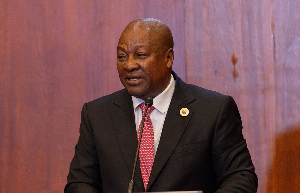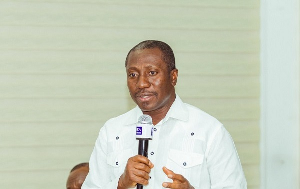Oral Village Ideas
By
Daniel Appiah-Adjei
Nothing Ruled Out; History Is Important
I have always been thinking about the fact that most scholars always want to be tagged with big names in the academic spheres. ‘Where Kofi Owusu, my junior brother would retort ‘Ei, don’t joke with that gentleman or lady, he/she is a lawyer or a doctor or an engineer’ or a businessman.. In fact not my noble profession...Dramatist; as for that, someone will ask… ’What is that?’ ha ha ha.
As much as I believe that these professions are very important, I would want to speculate and humbly demand of the society not to look down upon History and other related subjects like Theatre and thus see them as important as all other important subjects.
Before I continue with my crusade, let us consider this wise saying about History.
‘History is for human self-knowledge…Knowing yourself means knowing what you can do; and since nobody knows what they can do until they try, the only clue to what man can do is what man has done. The value of history, then, is that it teaches us what man has done and thus what man is’ - R. G. Collingwood
The study of history of any kind is always difficult, not only because of human factor is so pronounced, but because the atmosphere of the past events is not the atmosphere we breathe today. Reliability of the evidence is the first requisite, the second being, the reliability of the conditions, in which the events described took place. Yet it is crucial for the decision makers to understand what makes up the text that is read in the search for answers. In this way, we can see that history is part myth, part construction.
The Construction of History
For as long as there have been human beings on earth, there has been history. In the pre-historic days, Homo Sapiens had told what had happened the last day. It has been passed on from generation to generation, by word of mouth, by song, dance or drawings which form a record, a narrative of the past that serves as part of the context. It becomes a myth, an explanation of why things are the way they are. It is more than a mere catalogue of past actions; it helps to explain why it happened. By extension, it serves to dictate how the present should be ordered; it explains how things should happen. The record of history though is charged with 'Whys' and 'Hows' of long ago. The facts do not speak for themselves; we speak for the facts. History should not be distorted by the politicians/rulers because to the coming generations it is the historian, not the past which does the dictation to history.
Defining History
I am not a practicing historian so it will be very difficult to accurately define history but the little history I learned from school has provided me with this definition and that;
History could mean the bodies of knowledge about the past produced by historians, together with everything that is involved in the production, communication of, and teaching about that knowledge.
This is in the recognition of the simple fact that knowledge of the past is essential to society. What happens in the present, and what will happen in the future, is very much governed by what happened in the past. It is obvious that knowledge of the past has not brought easy solutions to problems. But without a thorough knowledge of past events and circumstances, we could not even attempt to grapple with these problems. Without knowledge of the past we would be without identity, we would be lost on an endless sea of time.
The simplest answer to the questions of the ignorant “Why do history?" or "What is the use of history?" is: "Try to imagine what it would be like to live in a society where there was absolutely no knowledge of the past." The mind boggles. Of course, if history has this vital importance for society, then it must be as accurate as possible; it must be based on evidence and logical thought, not on specious theory or political ideology.
Food for thought
I see it as a kind of hypocrisy on the part of many scholars when they turn away from History and see it as not very important. Is it not true that everybody is eager to know what happened? Those who study history, for career purposes, or just for personal enjoyment, have other reasons apart from this all-embracing justification for resources being channelled into the study of history.
Many of us feel the almost poetic appeal of the past, have a passionate interest in finding out what really did happen in the past - practically all of the world's major tourist traps relate to the appeal of the past. It is historians who provide the contextual knowledge that eventually works its way into the guide books, and again the need is for accuracy not unfounded theory. Historians also provide the contextual knowledge for great works of art and literature, thus enhancing our enjoyment of these. In addition, the study of history offers to individuals major utilitarian learning outcomes. Training in history is training in analysing, evaluating, and interpreting both secondary and primary sources. It develops an understanding that everything written pertaining to history, secondary or primary, must be approached with skepticism and caution. It develops the ability to distinguish between pieces of writing which are well-substantiated and logical, and those which simply express theory, hypothesis, or opinion. The skills and learning outcomes rising from historical study are invaluable in a contemporary world which is dominated by information and communications. The methods and skills required of the historian, and, more important, the attitudes of mind transmitted in the teaching of history, are of vital importance in assessing and filtering the messages constantly battering against us. History also provides training in the writing up of the results of one's researches, in the form of essays, reports, dissertations. What is essential in history is clear and effective communication, well structured, and written in precise and explicit language.
HISTORY AND HUMAN VALUES
Many who call themselves "historians" do, indeed, use "history" as a vehicle for expressing their own political commitment. That is sheer is self-indulgence. History is a scholarly, not a political, activity, and while, as citizens, we certainly should act upon our political views, in writing history we have an absolute obligation to try to exclude them. Most historians, like, most scientists, are motivated by the urge to find out. Much nonsense is talked about historians inevitably being "subjective"; the real point is that, being mere human beings, they are "fallible", and subject to many kinds of career and social pressures, or indeed common incompetence. Historians do disagree with each other in their interpretations, as do scientists. But history deals with human values, in a way the sciences do not, so there is more scope for differences in evaluation.
Individual books and articles may clash with each other; there will always be areas where uncertainty persists, but steadily agreed knowledge emerges in the form of works of synthesis and high-quality textbooks. History, like the sciences, is a co-operative enterprise. Some historians today still seem to perceive historians (usually themselves) as great literary and media figures, as individual intellectual and moral giants giving leadership to ordinary readers. It will be heart-warming if every child attending school is provided with a history hand-book of his/her hometown or village.
Nothing Ruled Out
All human activities, including history, are culturally (or socially, the meanings in this instance are the same) influenced, but history is not "culturally constructed" or "culturally determined". Too many naïve statements have been made along the lines of "each age rewrites its history". History is not a formation dance in which everybody in one period marches in one direction, and then, in the next, marches off in a different direction. One of the greatest strengths of history today is that nothing is ruled out. At its very core history must be a scholarly discipline, based on thorough analysis of the evidence, and in the writing up of which language is deployed with the utmost precision. There must be constant awareness of the methods and principles of that discipline, constant attention to how it is taught, and how, at different levels, it is communicated to wider audiences.
Those who cannot remember the past are condemned to repeat it.
I strongly believe that some noble personalities would in chorus, join me to recite what Etienne De Grellet said:
‘I expect to pass through this world but once; any good thing therefore that I can do, or any kindness that I can show to any fellow creature, let me do it now; let me not defer or neglect it; for I shall not pass this way again’
By His Grace I shall be back
Email: danappiah2@yahoo.com
Opinions of Friday, 27 August 2010
Columnist: Appiah-Adjei, Daniel
Nothing Ruled Out; History Is Important
Entertainment













